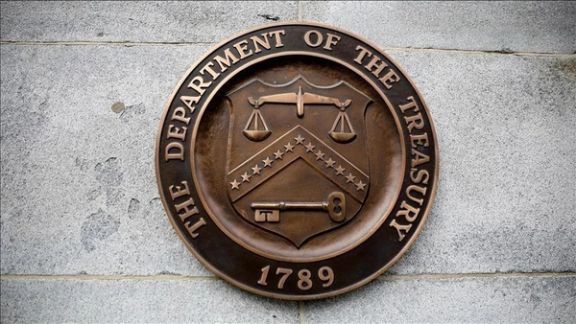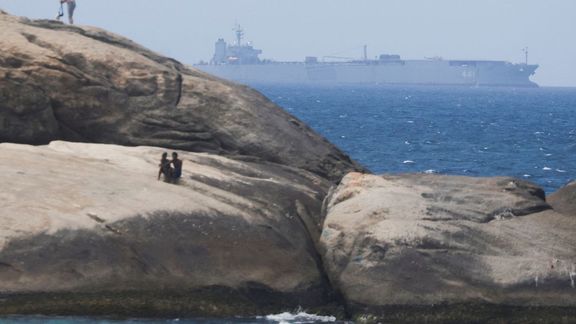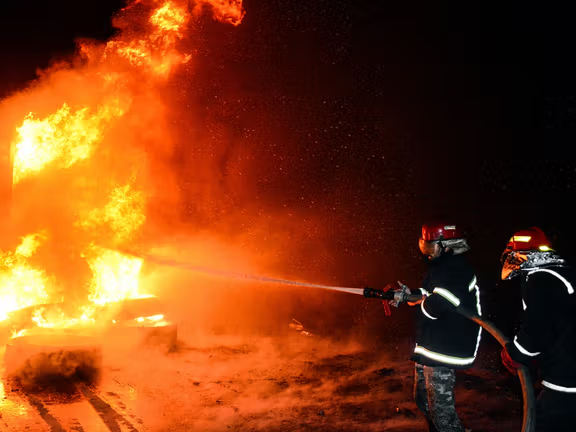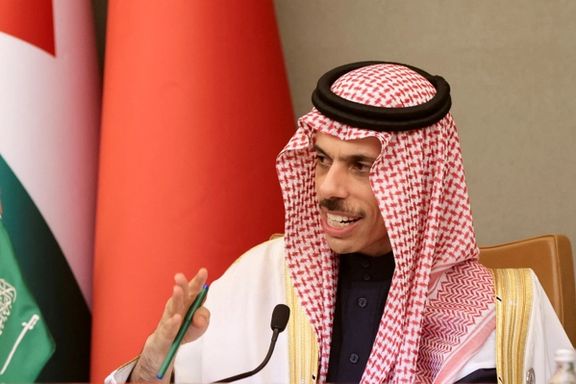US Targets Iranian Officials With New Sanctions On Women's Day

The United States Wednesday imposed sanctions on Iranian officials and companies over serious human rights abuses, stepping up pressure on Tehran over its crackdown on protests.

The United States Wednesday imposed sanctions on Iranian officials and companies over serious human rights abuses, stepping up pressure on Tehran over its crackdown on protests.
The US action came in concert with the European Union, Britain and Australia to mark International Women's Day.
The US Treasury Department in a statement said it imposed sanctions on two senior Iranian prison officials it accused of being responsible for serious human rights abuses against women and girls.
Washington also put sanctions on Iran's top army commander, a senior official in the Islamic Revolutionary Guard Corps and an official tied to the Iranian government's efforts to block internet access. Also hit with sanctions were three Iranian companies and their leaders who have enabled law enforcement repression, according to the statement.
The step marks the 10th round of such US sanctions since Tehran's crackdown on protests that began after 22-year-old Mahsa Amini died in September in the custody of the morality police.
The protests by Iranians from all walks of life mark one of the boldest challenges to the ruling theocracy since the 1979 Islamic Revolution.
"The United States, along with our partners and allies, stand with the women of Iran, who advocate for fundamental freedoms in the face of a brutal regime that treats women as second-class citizens and attempts to suppress their voices by any means," US Under Secretary of the Treasury for Terrorism and Financial Intelligence Brian Nelson said in the statement.
"We will continue to take action against the regime, which perpetuates abuse and violence against its own citizens -especially women and girls," Nelson added.
Wednesday's move freezes any US assets of those targeted and generally bars Americans from dealing with them.

The Islamic Republic’s activities in the Americas have stirred new concerns amidst the recent landing of its warships in Brazil, making Iran’s presence a little too close for comfort to the Biden administration.
The international community hoped the US to invoke consequences to the evident show of force from Iran, using The Monroe Doctrine, a foreign policy position from the first half of the 19th century, stating that any intervention in the political affairs of the Americas by foreign powers is considered a potentially hostile act against the United States.
Over almost two centuries, the doctrine has protected the US from unwanted foreign influence in the region. Most recently, it was invoked in the 1962 Cuban missile crisis when Kennedy gave an ultimatum to the Soviets to pull out their missiles. Experts wonder if such a historic foreign policy principle could be the answer to the threat of Iranian encroachment.
When asked about the US stance on the matter, US State Department spokesman Ned Price said the Doctrine was merely “a legacy of history”, but admitted Iran’s presence so close to home was of grave concern.
“A country like Iran poses a collective threat to the United States and to our partners in this hemisphere. It is our intention to work collaboratively with our partners in the region but even closer to this neighborhood on those types of threats,” he said.
With Brazil refusing to join the US in sanctioning Iran, dating back to 2010, options are running out as to how one of the world’s biggest powers, can fight the threat of Iran looming closer to its shores with a lack of legal mechanisms in place.
The spokesperson said Brazil is “a close democratic partner of the United States,” despite a turbulent history between the two nations, suggesting the docking was not a welcome move for the Brazilian government and that the two sides were coordinating on the issue.
“It’s our impression that no democracy in this hemisphere or anywhere else would want these kinds of Iranian assets, these warships docking in their ports,” he said. "Warships like this have no place in the Western Hemisphere, given the signal it sends.”
Of further concern is the fact that the warships docked in Rio de Janeiro are in fact designated.
“They [Brazil], I am confident, are aware of existing sanctions authorities,” said Price. “We are going to do what is most effective together in pushing back on the threat and the challenge that Iran poses.”

President Luiz Inacio Lula da Silva's government was urged by the Biden administration to send the warships -- IRIS Makran and IRIS Dena -- away in January, but recently bowed to Tehran, allowing them to dock in February.
The presence of the Islamic Republic in Latin America has been a growing concern for the US in recent years with several Congressional reports presented in different Senate and House committees detailing Iran’s influence in the region.
It has been one of a number of issues causing a rift between the US and its neighbors, not least, Brazil. In a Senate Foreign Relations Committee hearing in 2012, Bob Menendez (D-NJ) said that within four years of Ahmadinejad's election in 2005, Iran opened six new embassies in Latin America, including Bolivia, Chile, Colombia, Ecuador, Nicaragua, and Uruguay, in addition to the five embassies Iran already had.
Diplomacy with Iran was one of the highlights of Lula's attempts to bolster Brazil's international standing during his previous presidential terms. He traveled to Tehran to meet then-President Mahmoud Ahmadinejad in 2010 as he sought to broker a nuclear deal between Iran and the United States, Iran and Brazil old allies in the international arena.
During the Trump administration, then-Secretary of State Mike Pompeo time again condemned Iran for its illicit activities in Latin America, describing the regime as “the largest state sponsor of terror” that represents “a global threat”.
On a tour of South American countries in April 2019, Pompeo said in Paraguay that "Iranian money remains in South America ... supporting [Lebanese terror proxy] Hezbollah, supporting transnational criminal organizations, supporting efforts at terrorism throughout the region."
The latest warships’ issue has gained domestic and international condemnation. Senator Ted Cruz called for sanctions against the South American country after the docking, dubbing it "a direct threat to the safety and security of Americans”.
He said the Biden administration is obligated to impose relevant sanctions, re-evaluate Brazil's cooperation with US anti-terrorism efforts, and re-examine whether Brazil is maintaining effective anti-terrorism measures at its ports.
In Israel, Lior Haiat, spokesperson for Israel's Foreign Ministry, called the Brazilian berth for the warships "a dangerous and regretful development”.
Price defended the Brazilian government, however, and said in a press briefing, “It is certainly not the case that the Brazilian government, [or] the Brazilian people would want to do anything that would assist … a regime that is responsible for a brutal crackdown and violent repression against its own people.”

A war monitor says a drone strike has killed four people in government-held eastern Syria in an area controlled by Iran-backed militia factions.
The Britain-based Syrian Observatory for Human Rights reported on Wednesday that four people died when a building that was home to Iran-backed militiamen in the province of Deir el-Zour was targeted by drones.
"Four people were killed and eight wounded in a drone strike near a weapons factory belonging to Iran-backed groups and near a truck loaded with weapons," Rami Abdel Rahman of the Syrian Observatory for Human Rights told AFP.
However, the official Syrian state news agency SANA reported that a land mine exploded in Al-Hamidiya neighborhood of Deir el-Zour killing three and injuring seven.
The eastern oil-rich areas of the province are under the control of the Syrian government and allied groups of the Islamic Republic.
It is not clear who was responsible for the drone strike but Israel has been regularly targeting Iran-backed forces in Syria.
Earlier on Tuesday, an airstrike, which Syria blamed on Israel, hit the city of Aleppo's airport forcing it to halt operations. Reports said that the strike targeted Iranian arms supplies.
Israel had reportedly warned Iran in February against sending arms to Syria under the guise of humanitarian aid for the earthquake hit people of the country.
Israel has for years been carrying out attacks against what it has described as Iran-linked targets in Syria, where Tehran's influence has grown since it began supporting President Bashar al-Assad in the civil war that began in 2011.

Saudi Arabia says the nuclear deal with the Islamic Republic is not “ideal” and that any agreement must address the concerns of neighboring countries.
Foreign Minister Faisal bin Farhan made the remarks on Tuesday in London telling reporters that Riyadh is open to hold negotiations with Tehran.
Saudi Arabia has time and again expressed concerns over “transgressions by Iran”, particularly in its nuclear program.
Saudis say Iran's activities do not match with what Tehran declares about “the peaceful nature” of its nuclear program.
Riyadh and other Sunni Arab government in the region have been concerned about Tehran's meddling in neighboring countries and supporting militant Shiite groups in Iraq, Lebanon and the Houthi forces in Yemen.
Riyadh severed ties with Tehran in January 2016 after a pro-government Iranian mob stormed the Saudi embassy in Tehran following the execution of a Shi'ite cleric in Saudi Arabia.
Consequently, Saudi Arabia cut all trade relations with Iran and banned its citizens from visiting the country for religious pilgrimages.
In 2019, Saudi Arabia’s critical oil processing installations in the east were targeted by kamikaze drones, claimed by the Iran-backed Houthi militias in Yemen. The strikes suspended over half of the nation’s 12 million barrels of daily oil production output.
Sunni Muslim Saudi Arabia and Shiite Iran, which are locked in proxy conflicts around the region, launched direct talks hosted by Iraq in 2021, however the efforts have not been fruitful so far.

Iran has sentenced Franco-Irish citizen Bernard Phelan to 6.5 years in prison for "providing information to another country", his sister said in a statement.
"The Franco-Irish citizen Bernard Phelan has just been sentenced to 6.5 years in prison in Iran for having provided information to an enemy country," Caroline Phelan said in a statement. She added that her 64-year-old brother was at risk of dying in custody.
"He had been promised an early release for health reasons before this was cancelled."
Ties between France and Iran have deteriorated in recent months with Tehran detaining seven French nationals in what Paris has said are arbitrary arrests that are equivalent to state hostage taking.
Phelan, a tourism consultant, was detained in early October as anti-government protests spread across the country.
France has demanded that Iranian authorities provide him urgent medical care due to a heart condition.
A spokesperson for Ireland's Department of Foreign Affairs said the government was extremely concerned about the case, especially given Phelan’s ill health.
Phelan's sentence comes just days after a second French national, Benjamin Briere, who has been held since May 2020 after being sentenced to eight years, was cleared of all charges and ordered to be released from prison, his lawyer said in a statement on March 2.
However, he has since remained in custody without a reason given for his ongoing detention.
In recent years, Iran's elite Revolutionary Guards have arrested dozens of dual nationals and foreigners, mostly on charges related to espionage and security.
Rights groups have accused Iran of trying to extract concessions from other countries through such arrests. Iran, which does not recognize dual nationality, denies taking prisoners to gain diplomatic leverage.
Report by Reuters

The US-based Human Rights Activists News Agency (HRANA) has described the situation of women in Iran as "dire" on International Women's Day, March 8.
Protests and violent unrest since September, triggered by the death in custody of Mahsa Amini, arrested by the morality police for not wearing her hijab properly, have led to a shocking 66 female deaths including at least 14 female death-row inmates being executed in different prisons and two women receiving the death penalty.
With women having been at the forefront of protests, burning headscarves and cutting hair in protest against the oppression of the Islamic Republic, the rights group said "at least 3,953 women were arrested, of which 1,019 were identified by HRANA, [and]160 of them were female university students.”
According to HRANA, since September's unrest, at least 2,003 women were reprimanded in different ways, including being summoned to police authorities, due to the improper wearing of the hijab.
The report went on to document the attacks seen across the country on girls' schools and university dormitories, which began on November 30 in Qom.
“Since the beginning of December 2022, at least 290 attacks on schools affecting at least 7,060 students have been reported. This number of affected students is exclusive to the 103 schools that have reported data in this regard,” the group said.
Nearly four months after the beginning of suspected poisonings in schools in Iran, which have now spread to the dormitories of female students, the authorities of the Islamic Republic have failed to provide a convincing clue regarding the attacks.
"Despite the advances in women's situation worldwide, the statistical information shows their situation in Iran is alarming," the group said. "The situation of women in Iran is dire."
Brutality and oppression against women continues, with at least 15 women killed for 'honor reasons, according to the latest report. “Honor killings are a brutal practice in which women are murdered by their family members for bringing 'dishonor' to their family. This practice is not only a violation of women’s rights, but the practice also serves as a grave violation of human rights and the right to life," it said.
Several factors prevent rights groups from analyzing the full scope of violations committed against women in Iranian society and urgent action is required to address the issues faced by women in Iran on a daily basis rooted in gender-based discrimination codified in both law and practice.
"The government must take concrete steps to protect women’s rights, end discriminatory laws and practices, and ensure that perpetrators of violence against women are brought to justice," HRANA's report stated. "On this International Women’s Day, we must continue to raise awareness of the struggles faced by women in Iran and advocate for their rights and equality."
The sentiments of the HRANA report are echoed by rights groups worldwide. In December, Iran was removed from the UN Commission on the Status of Women. Given the situation in Iran, it said: “Iran’s membership at this moment is an ugly stain on the Commission’s credibility.”